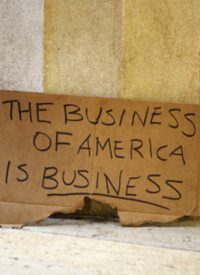
"Congress is to be applauded for tackling financial regulatory reform," wrote U.S. Chamber of Commerce president Thomas J. Donahue in an op-ed piece published yesterday by the D.C. political journal, The Hill. But for most of the piece, Donahue appeared to be applauding with one hand, using the other to point to what the Chamber regards as a severe overreach in the regulatory bill now before the Senate.
The bill, sponsored by Senate Banking Committee Chairman Christopher J. Dodd (D-Conn.) and backed by the Obama administration, would "place new burdens on Main Street businesses that had nothing to do with the financial crisis," Donahue wrote. The authority given to a new Bureau of Consumer Financial Protection is far too broad, the Chamber chief said.
"The proposed new consumer protection regulator would be able to regulate a merchant, retailer, doctor, public utility, or any other business that permits payment in more than four installments or assesses late fees," Donahue wrote. "No wonder the first year’s budget for this new regulator is $410 million."
A wide range of businesses and their lobbyists are busy this week trying to convince Congress and administration officials that regulatory authority written into the bill is so wide it will hamstring business activities far removed from the kind of financial trading done by Goldman Sachs, AIG, and other large Wall Street firms that Congress has targeted for increased regulation. Today’s New York Times reports that auto dealers from 35 states are lobbying senators this week for exemptions from federal regulations in the bill that would otherwise cover them as lending institutions. Officials at Harley-Davidson are likewise worried that dealer-financed loans to buyers of the company’s motorcycles will be covered by new federal regulations.
"I don’t think the level of concern could be any higher," David Hyatt, vice president for the National Automobile Dealers Association, told the Times. "There’s a sense of urgency. And we’ve got to raise awareness about why this doesn’t make sense and why it’s anticonsumer."
Mars, the maker of M&M’s and Snickers, could be affected, since the company deals in derivatives affecting the price of sugar and chocolate for the candy it manufactures. Payday lenders fear federal regulation of short-term loans to workers trying to survive until the next paycheck, and eBay, whose subsidiary PayPal uses the Internet to facilitate payments to service providers by their customers could also come under the broad sweep of the reform bill.
"There is a fair amount of caution any time the federal government proposes new oversight," Christopher Colwell, a lobbyist for the payday lender Check ‘n’ Go, told the Times. "We are trying to determine what impacts these proposals will have on business, intentionally or unintentionally."
What kind of companies would be covered, "intentionally or unintentionally," is itself a subject of debate on Capitol Hill. Appearing on NBC’s Meet the Press on Sunday, Sen. Dodd called it a "red herring" to suggest the legislation would harm ordinary businesses. "The bill doesn’t target those companies," Kristen Brost, communications director for the Senate Banking Committee, told the Times. "It targets the financial companies, and it changes things for financial companies."
But "financial companies" can cover a multitude of definitions, argues John Berlau of the Competitive Enterprise Institute. "And the bill’s definition of ‘nonbank financial company’ is so broad that it could cover manufacturers only tangentially involved in extending credit, such as those that lease equipment to their customers," Berlau wrote on OpenMarket.org "This would raise prices and cost Main Street jobs." While supporters of bill insist that taxpayers’ money would not again be used to bail out corporations deemed "too big to fail," financial companies would be assessed fees to cover the cost of dissolving a failing company and paying off its creditors.
"Stable life, auto and home insurance companies would have to pay into this fund to subsidize the failure of the next high-roller, and the fees they pay would likely be passed on in the premiums their policy holders pay," wrote Berlau.
The added costs and additional regulatory and liability burdens under the bill’s consumer protection panel would effectively limit access to credit, choking off growth and jobs in small businesses, argues Donahue. "Unlike the Federal Trade Commission or the Securities and Exchange Commission, the proposed Bureau of Consumer Financial Protection would be headed by a single director without a bipartisan commission to provide necessary checks and balances," he wrote. "Once confirmed by the Senate, this director would report to no one and would have the authority to write and enforce new rules and decide how to spend his or her massive budget." The national Chamber favors reforming the financial regulatory system within the existing structure.
"Instead of a new, all-powerful regulator, the U.S. Chamber of Commerce believes we should create a Consumer Protection Council to ensure coordination of regulatory and enforcement actions among the seven existing federal financial regulators," Donahue wrote. But some critics argue that streamlining or otherwise reforming the current regulatory system will neither solve the problems that led to the financial meltdown in 2008 nor prevent future crises. Peter Schiff, president of Euro Pacific Capital and a Republican candidate for U.S. Senate from Connecticut, argues that the policies pursued by the Federal Reserve Board and the existing network of regulatory agencies continue to distort the market and create economic havoc.
"So long as the Fed continues to hold interest rates artificially low and the government continues to guarantee mortgages, real estate prices will remain distorted, credit will be misallocated, moral hazards will increase, and the underlying fundamentals of our economy will continue to deteriorate," Schiff wrote in Investor News. "As a result, the next financial crisis, likely to hit within a few short years, will be that much worse."



